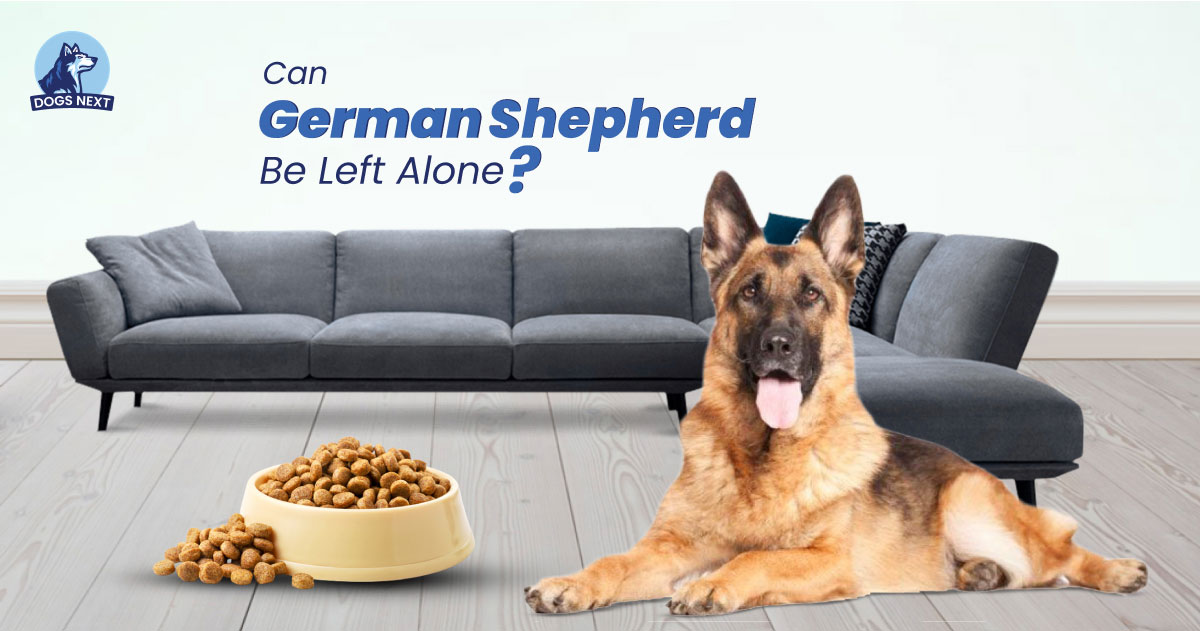German Shepherds are intelligent and loyal dogs that can adapt to being alone for short periods. They thrive on social interaction and mental challenges. Properly training your German Shepherd is essential to prevent anxiety and destructive behavior. Ensure they have toys and activities to keep them engaged while you are away.
Regular exercise is crucial to their well-being. Leaving them alone for extended periods without preparation can lead to behavioral issues. Be mindful of their needs and create a balanced routine. This ensures a happy and well-adjusted German Shepherd in your home.
Can A German Shepherd Be Left Alone?
German Shepherds are known for their intelligence and loyalty. They are a popular breed among dog owners. But can a German Shepherd be left alone? This is a common question among prospective owners. Let’s explore the factors that influence this.
Factors To Consider
Several factors affect whether a German Shepherd can be left alone:
Understanding these factors can help you make an informed decision.
Age And Training
Age and training play a crucial role:
Training should start early:
- Basic Commands: Teach sit, stay, and come.
- Crate Training: Helps them feel secure when alone.
- Gradual Alone Time: Increase the time they spend alone slowly.
Consistent training builds confidence and reduces anxiety.
Temperament And Personality
Temperament and personality vary among German Shepherds:
Understanding your dog’s personality is key:
| Personality Type | Alone Time Tolerance |
| Confident | High |
| Anxious | Low |
Knowing your dog’s personality helps you cater to their needs better.
Daily Routine And Environment
A consistent routine and a stimulating environment are essential:
Creating a stimulating environment helps:
- Toys: Provide interactive toys to keep them engaged.
- Background Noise: Leave the TV or radio on for comfort.
- Comfort Items: Blankets or items with your scent can soothe them.
These steps can make alone time less stressful for your German Shepherd.
Temperament
Temperament plays a significant role in alone time tolerance:
Temperament can be influenced by:
| Factor | Impact |
| Genetics | Inherited traits |
| Socialization | Early exposure to various situations |
Understanding your dog’s temperament helps tailor their care and training.
Exercise
Exercise is vital for German Shepherds:
Regular exercise prevents boredom and anxiety:
- Morning Walk: Helps burn off energy before you leave.
- Evening Play: Provides a routine they can expect.
- Interactive Toys: Keeps them engaged while you are away.
A well-exercised dog is more likely to rest and stay calm when alone.
How Long Can A German Shepherd Be Left Alone?
Can a German Shepherd Be Left Alone? This is a common question for many pet owners. German Shepherds are loyal and intelligent dogs. But, they also need human companionship. Leaving them alone for long periods can lead to anxiety and destructive behavior. So, how long can a German Shepherd be left alone?
Age plays a big role in how long a German Shepherd can stay alone. Puppies need more attention than adults. Older dogs may also have special needs. Understanding these differences is crucial.
For Puppies
Puppies need constant care and attention. They cannot hold their bladder for long. A general rule is one hour for each month of age. A 3-month-old puppy can be left alone for about 3 hours. Make sure to provide toys and a safe space for them.
For Adult German Shepherds
Adult German Shepherds are more independent. They can be left alone for longer periods. On average, an adult can stay alone for 4 to 6 hours. This varies based on their training and individual personality.
For Senior German Shepherds
Senior dogs may need more frequent breaks. They may also suffer from health issues. Typically, it’s best not to leave them alone for more than 4 hours. Regular check-ins can ensure their well-being.
Factors That Influence Alone Time
Tips For Leaving Your German Shepherd Alone
- Provide toys to keep them occupied.
- Leave the TV or radio on for background noise.
- Ensure they have a comfortable resting area.
- Consider hiring a dog walker for longer periods.
Summary Table
| Age | Alone Time |
| Puppies | 1 hour per month of age |
| Adults | 4 to 6 hours |
| Seniors | Up to 4 hours |
Safe Alone Time Limits
German Shepherds are known for their intelligence and loyalty. However, many owners wonder if they can leave their furry friends alone for extended periods. Understanding safe alone time limits is essential to ensure their well-being. This guide will help you set appropriate alone time for your German Shepherd.
Safe Alone Time Limits For Puppies
German Shepherd puppies need more attention and care. They require frequent potty breaks and social interaction. Leaving a puppy alone for too long can lead to anxiety and destructive behavior.
Always provide toys and activities to keep them engaged during alone time.
Safe Alone Time Limits For Adult German Shepherds
Adult German Shepherds can handle longer periods alone. However, they still need physical and mental stimulation. Here are some safe limits:
| Age | Maximum Alone Time |
| 6-18 months | 4 hours |
| 18 months and older | 6-8 hours |
Ensure they have ample exercise before and after being left alone.
Creating A Safe Environment
To make alone time safe and enjoyable, create a comfortable environment. Use these tips:
- Provide a cozy bed or crate
- Leave interactive toys
- Ensure access to water
- Keep a consistent routine
A secure and familiar space helps reduce anxiety and stress.
Recognizing Signs Of Distress
Watch for signs that your German Shepherd is not coping well with alone time. Common signs include:
If these signs appear, consider adjusting the alone time or seeking professional help.
Preparing Your German Shepherd For Alone Time
German Shepherds are known for their intelligence, loyalty, and energy. While they make great companions, many dog owners wonder if they can be left alone. Proper preparation is key to ensuring your German Shepherd is comfortable and safe during alone time. This involves physical exercise, mental stimulation, and creating a comfortable space.
Physical Exercise
Physical exercise is essential for German Shepherds. These active dogs need plenty of activity to stay happy and healthy. Daily exercise helps prevent destructive behavior. Here are some ways to ensure your German Shepherd gets enough physical activity:
Consistency is key. Create a routine that fits your lifestyle and stick to it. Even on busy days, a quick play session can make a big difference.
| Activity | Duration |
| Walk | 30 minutes |
| Fetch | 20 minutes |
| Agility | 15 minutes |
Mental Stimulation
German Shepherds are incredibly intelligent and need mental challenges to stay engaged. Mental stimulation prevents boredom and reduces anxiety. Here are some ideas:
- Puzzle Toys: Invest in toys that challenge your dog’s problem-solving skills.
- Training Sessions: Short training sessions can be mentally stimulating.
- Interactive Games: Games like hide and seek keep their minds sharp.
Incorporate these activities into your dog’s daily routine. Rotate toys and games to keep things interesting. This keeps your German Shepherd mentally fit and less likely to engage in destructive behavior.
Creating A Comfortable Space
Your German Shepherd needs a safe and comfortable space when left alone. This space should make them feel secure and relaxed. Consider the following tips:
Make sure the area is free from hazards. Keep dangerous items out of reach. A crate can also be a good option if your dog is crate-trained.
| Item | Purpose |
| Bed | Comfort |
| Toys | Occupy time |
| Crate | Safety |
By ensuring your German Shepherd gets enough physical exercise, mental stimulation, and has a comfortable space, you can make their alone time stress-free and enjoyable.
Coping Strategies For Separation Anxiety
German Shepherds are known for their loyalty and intelligence. They form strong bonds with their owners, which can lead to separation anxiety. Separation anxiety can cause stress for both the dog and the owner. Fortunately, there are coping strategies that can help alleviate this issue.
1. Create A Safe Space
Set up a designated area in your home where your German Shepherd feels safe. This could be a specific room or a cozy corner. Make sure this space has their favorite toys and a comfortable bed. A familiar environment can reduce anxiety.
2. Use Interactive Toys
Interactive toys can keep your dog occupied for hours. Consider toys that dispense treats or require problem-solving. These toys stimulate your dog’s mind and keep them engaged.
3. Establish A Routine
Consistency is key. Establish a daily routine for feeding, walks, and playtime. Dogs thrive on routine and predictability. A consistent schedule helps them feel secure even when you are not around.
4. Gradual Desensitization
Gradually get your dog used to being alone. Start by leaving them alone for short periods and gradually increase the time. This helps them understand that you will always return. Patience and consistency are vital for this process.
5. Use Calming Aids
Consider using calming aids like pheromone diffusers or anxiety wraps. These products can help soothe your dog’s nerves. Always consult your vet before introducing new calming aids.
6. Professional Training
If separation anxiety persists, seek professional help. A certified dog trainer can provide personalized strategies. Professional training can make a significant difference in managing anxiety.
Alternatives To Leaving Your German Shepherd Alone
German Shepherds are known for their intelligence, loyalty, and energy. Leaving these active dogs alone for long hours can lead to anxiety and destructive behavior. Fortunately, there are alternatives to leaving your German Shepherd alone. These options ensure your pet gets the attention and care it needs.
1. Doggy Daycare
Doggy daycare offers a perfect solution. Your German Shepherd gets to socialize and play. This prevents boredom and loneliness. Look for a daycare with experienced staff and ample space.
| Benefit | Description |
| Socialization | Interacts with other dogs and people. |
| Exercise | Get plenty of physical activity. |
| Supervision | Always under watchful eyes. |
2. Hire a Dog Walker
Hiring a dog walker breaks up your dog’s day. This ensures they get exercise and a bathroom break. It also provides a chance for one-on-one attention. Look for professionals with good reviews and experience with large breeds.
3. Pet Sitting Services
Pet sitting services come to your home. This is great for dogs that prefer familiar surroundings. A pet sitter can provide meals, walks, and playtime. This ensures your German Shepherd feels secure and content.
4. Interactive Toys and Puzzles
Interactive toys and puzzles keep your dog mentally stimulated. These toys challenge their minds and keep them occupied. Consider toys that dispense treats or require problem-solving.
5. Enlist the Help of Friends or Neighbors
Friends or neighbors can check in on your dog. They can take them for a walk or play with them. This is a cost-effective option that builds community bonds.
Frequently Asked Questions
Can A German Shepherd Be Left Alone?
Yes, but only for short periods. German Shepherds are social and need interaction. Long absences can cause anxiety.
How Long Can German Shepherds Stay Alone?
Ideally, no longer than 4-6 hours. Extended isolation can lead to behavioral issues and anxiety in German Shepherds.
Do German Shepherds Get Separation Anxiety?
Yes, German Shepherds are prone to separation anxiety. They are loyal and thrive on companionship.
What Happens If A German Shepherd Is Left Alone Too Long?
They may develop anxiety, become destructive, or exhibit excessive barking. Long periods alone are not recommended.
Conclusion
Leaving a German Shepherd alone requires careful planning and consideration. These dogs thrive on companionship and mental stimulation. Ensure they have toys and a safe environment. Consider hiring a pet sitter or using doggy daycare. With proper care, German Shepherds can handle short periods alone without feeling anxious or stressed.

I’m David, an expert contributor and writer, with two furry friends of my own, I know the challenges of raising and caring for dogs. From training to nutrition and health, my goal is to provide valuable insights and advice to help create strong bonds and happy, healthy lives. Find me in Twitter.




